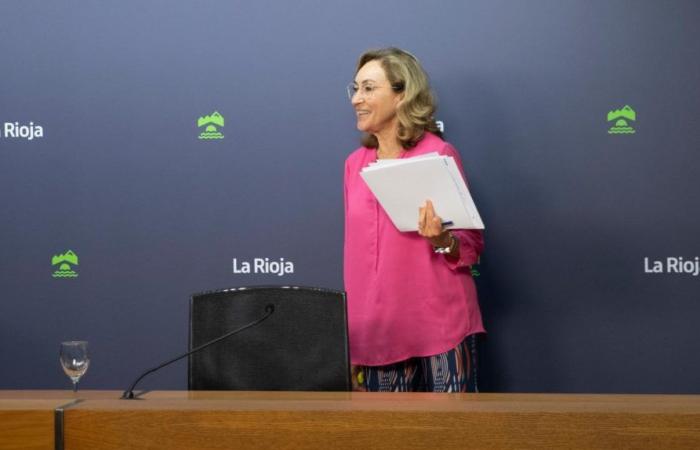
The Minister of Health and Social Policy, Maria Martinhas informed the Government Council of the processing of the new decree by which it is going to regulate coordinated care in nursing homes of La Rioja, both from the Social Services and Health responsibilities. It will replace the previous decree dating from 1998.
This regulation is based on the Resolution of July 28, 2022 of the Secretary of State for Social Rights, which includes the agreement of the Territorial Council of Social Services on the common criteria for accreditation and quality of the centers and services of the System for Autonomy and Care for Dependency. As recalled in the thirteenth article of this text: “Health care is the responsibility of the National Health System, which will guarantee, in any case, the same level of access to the portfolio of services for people in a situation of dependency as for the rest of the population, regardless of whether they reside in private or collective homes.”
In the press conference after the Government Council, the counselor explained that “it will be the first time that regulatory support is given to the ‘Social care, Health care’ model that we have begun to implement in our community with the aim of increasing the quality of the long-term care we offer to the elderly.” In an increasingly aging society with chronic diseases, which has been experiencing important social, cultural and legislative changes, “we cannot continue offering the same solutions.” And the fact is that “when people need long-term care, neither the Health nor the Social Services system alone can provide an adequate response.”
Hence the commitment to “the new socio-health paradigm that will now be normatively supported and that will imply the modification of the service portfolios that both SERIS and Social Services and the residences themselves provide to people who have their habitual residence there.” .
Among other aspects, María Martín has indicated that the Decree will establish the ratios and category of professionals who care for residents in senior centers, adapting the requirements to the current system coordinated between Social and Health, and making the care framework more flexible. on the basis that tasks should not take precedence but rather attention to the person. The current Decree represents a very significant increase in first-level direct care personnel in the category of geroculturists compared to the 1998 Decree.
To determine the personnel that the residences must accredit, a minimum ratio of doctors, nurses, physiotherapists and occupational therapists will be established; and a global ratio at the second level of care that will provide centers with greater flexibility to hire other profiles that adjust to the care and attention needs of residents or reinforce those for which these minimums have been indicated.
The Decree will not be alien to the problem of staff shortage that affects the entire social and health system. However, the lack of these professionals will entail the obligation of the center to replace its deficit with an equivalent number of hours from another or other professionals from the other categories of the health care group or with double the hours from the direct care group of the center. first level.
That the professionals who care for the elderly are well trained is also a concern of the Government of La Rioja that will be included in the Decree, which will expressly indicate that training will be provided to them through the Rioja Health Service. Other areas of the Government such as Education, Employment or the Riojan School of Public Administration will also be involved in this objective, which are already working on training lines and promoting the hiring of these professional profiles.
Comprehensive care for the elderly involves developing it from a holistic conception that includes physiological/biological, psychological, social and spiritual aspects. Hence the need to have diversified and well-trained professionals who address everything from direct basic care to health care, social care and their relationships with the family and environment.
First steps: Special units from AP and greater coordination
One of the important points on which the new care model pivots is the creation of Special Health Care Units dependent on Primary Care that will travel to residences to reinforce the monitoring of the health of users.
The counselor has confirmed the start of the service as a pilot project in centers in the La Guindalera area, establishing personalized control of each case and strengthening coordination between AP and the Hospital Care areas (Liaison Geriatrics, Home Hospitalization and Palliatives). that cover care for the elderly admitted there.
The Decree will include another essential aspect for socio-health action, on which the Ministry has also been taking steps, which is the interoperability between the public health system and the social services system. This includes several measures, some already implemented, such as access to electronic medical records in all residences, or the exchange of social information, the management of complementary tests, the sending and receiving of clinical analyzes or access to the registry of wishes. advances of the Government of La Rioja.
The text of the Decree has already been submitted to prior consultation through the ‘Participa’ Portal of the Government of La Rioja and its administrative processing now begins with public consultation and referral to both the Sectoral Council of the Elderly and the Rioja Council of Social Services, maximums participation bodies regarding the elderly. The reports of the General Technical Secretariat of the Ministry of Health and Social Policies will also be mandatory; of the Organization, Quality and Evaluation Service; of the General Directorate of Legal Services and the Advisory Council of La Rioja. Finally, it must be approved by the Governing Council.
It is estimated that it may come into force after the summer. From that moment on, the new framework agreement that will govern the next contracts for public places in the residences will be approved and it will be then that the resolution of exemption from penalties established in the contracts that the administration maintains with the centers for the management of public places. In January of this year, these penalties were suspended pending adaptation of the regulations to the new requirements of the social and health care model.
Finally, María Martín recalled that the adoption of this new model means aligning our autonomous community with the priorities established in the European Pillar of Social Rights. Specifically, with principle 18 ‘Long-term care’, which establishes that everyone has the right to affordable and good quality long-term care. In addition, it takes into account the 20-30 Agenda, specifically Sustainable Development Goal (OSD) 3, which aims to guarantee a healthy life and promote well-being at all ages.





